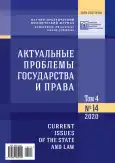IMPLEMENTATION PROBLEMS AND DEVELOPMENT TRENDS OF THE PRINCIPLE OF POWERS SEPARATION
- Authors: Turkaeva L.V.1
-
Affiliations:
- Grozny State Oil Technical University named after Academician M.D. Millionshchikov
- Issue: Vol 4, No 14 (2020)
- Pages: 180-186
- Section: General Theory and History of Law and the State
- URL: https://journal-vniispk.ru/2587-9340/article/view/304117
- ID: 304117
Cite item
Abstract
An integral component of the rule of law, which acts as an important attribute of the functioning of Russian constitutionalism institution, is the presence of public authorities, which provides a mechanism for stable governance. The modern model of the state structure of our country is based on many principles, a special place among which is given to the principle of powers separation, which became a novel of the Constitution of 1993. The operation of this principle is reduced to a triad of the following functions: enactment of laws, monitoring their implementation, and guaranteeing protection in case of violation. All three branches of government belong to the relevant public authorities, and are implemented independently and equally. Unfortunately, today there is no single concept regarding the ideological and political essence of this theory, although scientific ideology is in search of the primacy definition of one of three branches of government. The relevance and novelty of the problem under consideration is based on objective historical data, which are a fundamental part in the formation of the national legal system. We consider the legal basis of the principle of powers separation, various author’s points of view in determining its essence, including as a constitutional principle. The legal nature of the constitutional principle is explained by the legislative regulation of power between various public authorities and officials, as well as general powers exercised within certain areas of state activity.
About the authors
Laura Vahitovna Turkaeva
Grozny State Oil Technical University named after Academician M.D. Millionshchikov
Author for correspondence.
Email: turkaevalaura@mail.ru
ORCID iD: 0000-0001-7477-8075
Senior Lecturer of Legal Disciplines Department
Russian Federation, 100 Kh.A. Isaeva Ave., Grozny 364051, Chechen Republic, Russian FederationReferences
- Zrazhevskaya T.D., Savchenko S.A. Protsess razvitiya konstitutsionnykh printsipov razdeleniya vlasti v Rossii [The process of developing constitutional principles for the separation of powers in Russia]. Materialy Vserossiyskoy nauchno-prakticheskoy konferentsii «Razdeleniye vlastey v sovremennoy Rossii: problemy i perspektivy» [Proceedings of the All-Russian Scientific and Practical Conference “The Separation of Powers in Modern Russia: Problems and Prospects”]. Tyumen, Tyumen State University, 2008, pp. 73-78. (In Russian).
- Bobrova N.A. Konstitutsionnyy stroy i konstitutsionalizm v Rossii [Constitutional System and Constitutionalism in Russia]. Moscow, Uniti-Dana Publ., 2007, 20 p. (In Russian).
- Spiridonov L.I. Teoriya gosudarstva i prava [Theory of State and Law]. Moscow, Law Publ., 2007, 129 p. (In Russian).
- Avdeyev D.A. Printsip razdeleniya vlastey kak sposob organizatsii vlasti [The principle of separation of powers as a way of organizing power]. Materialy Vserossiyskoy nauchno-prakticheskoy konferentsii «Razdeleniye vlastey v sovremennoy Rossii: problemy i perspektivy» [Proceedings of the All-Russian Scientific and Practical Conference “The Separation of Powers in Modern Russia: Problems and Prospects”]. Tyumen, Tyumen State University, 2008, pp. 120-124. (In Russian).
- Khabriyeva T.Y., Nozdrachev A.F., Tikhomirov Y.A. Administrativnaya reforma: resheniya i problemy [Administrative reform: solutions and problems]. Zhurnal rossiyskogo prava – Journal of Russian Law, 2006, no. 2, pp. 3-23. (In Russian).
Supplementary files








